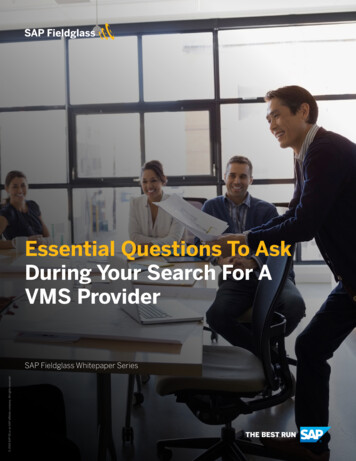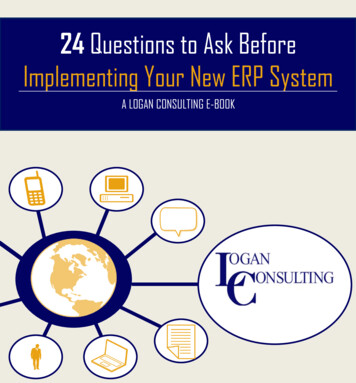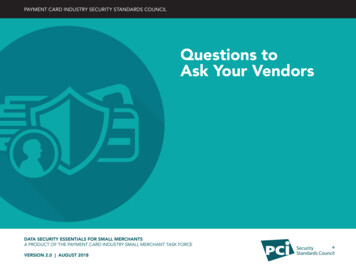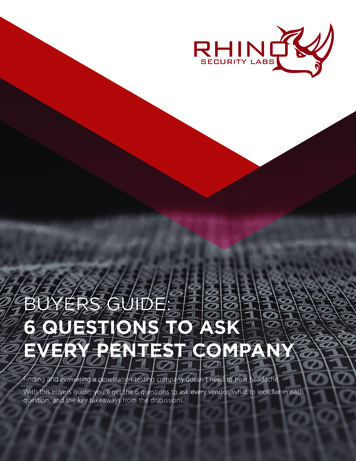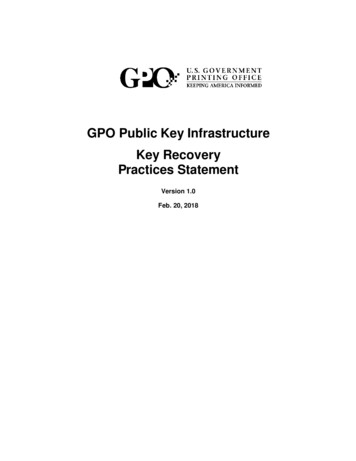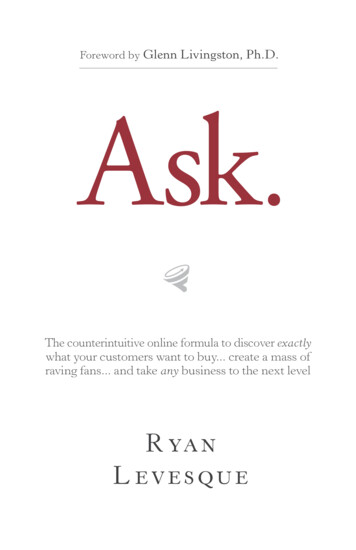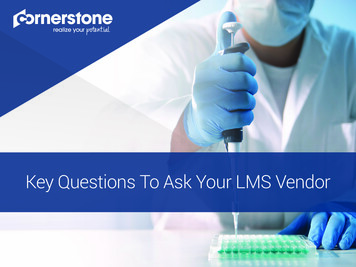
Transcription
Key Questions To Ask Your LMS Vendor
Learning in theWorkplace is ChangingWhile traditional companies may still rely primarily onFor life sciences organizations, an LMS can helpinstructor-led training, future-forward organizations areorganizations fulfill critical - 21 CFR Part 11 compliancefinding new, efficient ways to deliver just-in-time training. and other global regulatory needs. While finding an LMSLearning management systems (LMS) are the key tovendor with basic capabilities is fairly simple, partneringdelivering interactive methods of mobile learning, andwith a provider that understands the FDA mandates andcan offer the added advantage of integrating with talentGxP, ISO, GAAMP, and true risk management requiresmanagement goals.asking the right questions – and getting the right answers.csod.com/lifesciences
What key questions should your lifesciences organization be asking LMSproviders to ensure your ability tomeet 21 CFR Part 11 compliance?csod.com/lifesciences
Catalog Management: Considerationsfor Effective Content & ComplianceWhat options are available for structuring our catalog?How are courses delivered? Is there mobile capability?Is it flexible enough to meet the needs of both ourWill we be able to observe performance in the fieldGxP and non-GxP groups?without being tied to a laptop? Is there access to trainingCatalog management forms the foundation of yourwithout Internet or in areas of restricted bandwidth?organization’s ability to deliver courses quickly andAn LMS with mobile capabilities can facilitate real timeefficiently and track course completion for compliance.observation; offline capabilities enable training delivery inAn LMS that has an architecture that is already similarthe field when Internet access is limited or unavailable.to your existing catalog structure will reduce time spentmanually making adjustments to the system.Will we be able to assign training based on job code orlocation? Can the system alert us to recertification needsCan the LMS manage our versioning system simplyand track GxP credits?and without significant manual interventions?Create test scenarios to ensure the LMS is capable ofSimplified version control is key to avoiding extensiveautomatically assigning training to the right people at thehands-on interaction every time a course changes.right time, and notifying those individuals of these trainingrequirements. Confirm that the system can inform you,without significant manual effort, who needs to be certified,recertified, or who needs to complete a particular course.csod.com/lifesciences
Auditing Capabilities: AssessAppropriate Data for Quality Audit TrailsWhat data points need to be audited for each field?How can we access an audit trail?Do you need a user name? Or a first and last name? WillIf the audit trail is for a specific course and is pertinent toyou need a date stamp and/or a time stamp? Thesepeople at a specific location or job site, can these resultsdetails need to be addressed prior to choosing an LMS tobe filtered easily? Will you have to spend significant timeensure your expectations will be met. It’s also importantmanually combing through reports to find the data youto discover if there are workarounds if certain data pointsneed, or can the system quickly run a customized report?aren’t available.csod.com/lifesciences
Change Process: Evaluate DocumentationQuality & Configuration AbilitiesWhat is contained in release documentation?How might configuration change in any given release?How easy will it be to understand any changes inAre new configurations anticipated to be easy to implementfunctionality? How comprehensive is the vendor’sand understand, or will you need a dedicated team todocumentation? The ability to anticipate the change processmanage the changes?and changes in functionality will minimize the validationprocess when your vendor releases a new version.Can functionality be enabled and disabled?During a new release or interim fixes, it’s critical to beable to configure functionality at your own pace. Theability to enable and disable features ensures you cancontrol new functionality on your time schedule, andwhen you know you have access to adequate resourcesand training.csod.com/lifesciences
Reporting & Data Retrieval: Evaluate Reporting& Ease of Information Integration AbilitiesAre compliance/noncompliance reports configured in aCan we filter data in all reports?way that meets our organization’s requirements?Comprehensive filtering capabilities allow you to appropriatelyTo minimize manual manipulation, compliance reportslimit the data you deliver to the FDA during an audit.should be generated in a manner most similar to yourAre reports configurable? Can the system handleorganization’s existing structure.ad hoc requests?What level of report security is available?The capability to configure reports ensures your organizationMost organizations need to limit access to reporting tocan meet all reporting requirements in the future.ensure each department receives only the data pertinentDoes the system allow for external database access?to their group.To be most effective, the LMS should be able to leveragedata not already in the system.Cornerstone OnDemand is a global talent management software provider that is pioneeringsolutions to help organizations realize the potential of a modern workforce. csod.com 2015 Cornerstone OnDemand moreinfo@csod.com 888-365-CSODStay connected:
Learning management systems (LMS) are the key to delivering interactive methods of mobile learning, and can offer the added advantage of integrating with talent management goals. For life sciences organizations, an LMS can help organizations fulfill critical - 21 CFR Part 11 complianc

